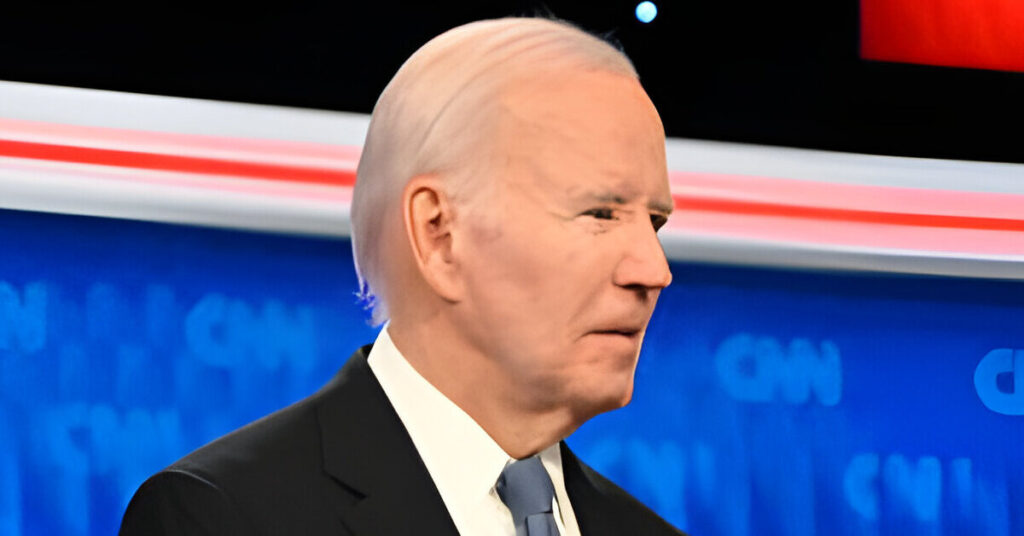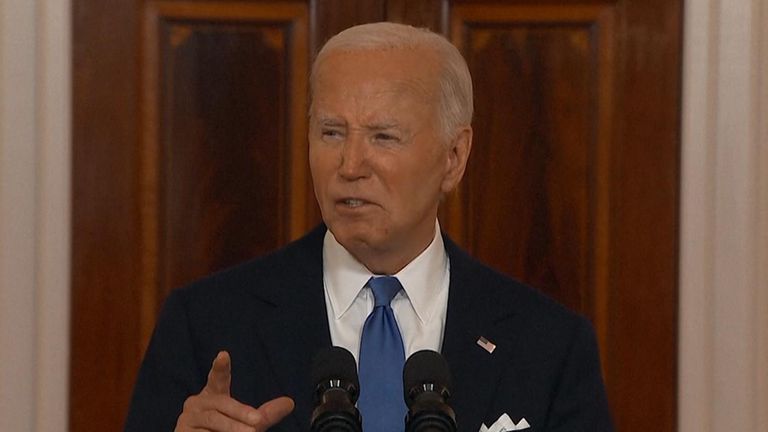Biden vs. Trump: Epic Debate Rematch of 2020!
Introduction
The stage is set for an epic rematch that promises to be one of the most electrifying events in recent political history. As President Joe Biden and former President Donald Trump prepare to go head-to-head once more in a highly anticipated debate, the atmosphere is charged with anticipation and high stakes. This confrontation is not just a repeat of the 2020 presidential debates but a critical juncture for the future of American politics. This report delves into the dynamics of the upcoming debate, analyzing the candidates, their strategies, key issues, and the potential impact on the 2024 presidential election.
Reflecting back on the 2020 presidential debates between Joe Biden and Donald Trump, one cannot forget the spectacle of sharp exchanges, interruptions, and contrasting visions for America. The debates were marked by a cacophony of accusations and personal jabs, capturing the polarized state of American politics. The first debate, held in Cleveland, Ohio, was especially chaotic, with Trump frequently interrupting Biden, leading to a disjointed and contentious dialogue. The second debate was replaced by separate town hall meetings due to COVID-19 concerns, and the third debate saw a more controlled environment but still highlighted the stark differences between the two candidates.
Joe Biden enters this debate as the incumbent president, carrying the weight of his administration’s achievements and challenges. Since taking office, Biden has navigated through a pandemic, economic recovery efforts, international tensions, and significant legislative battles. His presidency has been marked by efforts to unify the country, tackle climate change, expand healthcare, and rebuild alliances with global partners.
Biden’s strategy in the debate will likely focus on highlighting his accomplishments and contrasting them with Trump’s tenure. He will emphasize the successful rollout of COVID-19 vaccines, the passage of the Infrastructure Investment and Jobs Act, and his administration’s efforts to address climate change through executive orders and policy initiatives. Biden will also address the challenges faced during his term, including the chaotic withdrawal from Afghanistan, inflation concerns, and ongoing debates over social and economic policies.
Donald Trump, having been a dominant figure in American politics even after his presidency, approaches the debate with a fervent base and a relentless drive to reclaim the White House. Despite controversies and legal challenges, Trump remains a potent force within the Republican Party. His campaign is built on a narrative of resilience, portraying himself as a victim of political persecution and a champion of the forgotten American. Trump’s debate strategy will likely involve attacking Biden’s record, emphasizing issues such as the border crisis, inflation, and what he perceives as the failures of the current administration.
He will aim to energize his base by reiterating his stance on law and order, economic growth, and America-first policies. Trump’s rhetorical style, known for its aggression and unpredictability, will be on full display as he seeks to dominate the debate stage and frame Biden as ineffective and out of touch.
One of the central issues will be the state of the economy. Biden will point to job growth, the recovery from the pandemic, and infrastructure investments. Trump will counter by focusing on inflation, supply chain disruptions, and rising costs of living, arguing that these issues are a direct result of Biden’s policies. The pandemic remains a pivotal topic. Biden will highlight the successful vaccination campaign and efforts to manage the public health crisis.
Trump is expected to criticize Biden’s handling of the pandemic’s economic impact and argue that his own policies were more effective in balancing health concerns with economic stability. Immigration will be a contentious topic. Biden’s approach has been more compassionate, focusing on reform and humane treatment of migrants. Trump will emphasize border security, the need for stricter enforcement, and the perceived failures of the Biden administration to control illegal immigration.
The chaotic withdrawal from Afghanistan will be a significant point of debate. Biden will defend his decision as necessary to end a long and costly war, while Trump will argue that the execution was poorly managed and damaged America’s global standing. Other topics will include relations with China, Russia, and the ongoing tensions in the Middle East. Biden’s administration has made climate change a priority, rejoining the Paris Agreement and implementing various policies to reduce carbon emissions.
Read More:Biden vs Trump: Whose Economic Plan Reigns #1?
Trump, who has often downplayed climate change, will argue that Biden’s policies harm the economy and American energy independence. Healthcare remains a critical issue for many Americans. Biden will promote his efforts to expand access to healthcare and lower prescription drug costs. Trump will criticize the Affordable Care Act and propose alternatives that he claims will be more effective and less costly.
The dynamics of the debate will be influenced by the personalities and styles of the two candidates. Biden’s approach is likely to be measured and policy-focused, aiming to present himself as a steady and experienced leader. Trump, on the other hand, will bring his characteristic bombast and direct attacks, seeking to dominate the narrative and portray Biden as weak and ineffective. Public perception of the debate will be crucial.
In the age of social media, soundbites and viral moments can significantly impact voter opinions. Both campaigns will be prepared to capitalize on any gaffes or memorable exchanges to reinforce their messages. The debate will also be a test of each candidate’s ability to connect with undecided voters and sway those who may be dissatisfied with the current state of affairs.
Media coverage will play a vital role in shaping public opinion before, during, and after the debate. News networks, social media platforms, and political analysts will scrutinize every word, gesture, and expression of the candidates. The post-debate analysis will focus on who “won” the debate, which arguments resonated most with viewers, and how the debate might influence the polls. The media will also highlight fact-checking, verifying the accuracy of claims made by both candidates. This aspect is particularly important given the prevalence of misinformation and the need for voters to base their decisions on factual information.
The outcome of this debate will have significant implications for the 2024 presidential election. A strong performance by Biden could reinforce his position as a capable leader and energize his base. Conversely, a commanding performance by Trump could solidify his status as the Republican frontrunner and rally his supporters. For undecided voters, the debate will provide a clear contrast between the two visions for America’s future. The issues discussed and the candidates’ responses will help shape the narrative of the election campaign, influencing voter priorities and concerns.
The Biden vs. Trump debate rematch is more than just a political spectacle; it is a defining moment in American politics. As both candidates prepare to face off, the nation watches with bated breath, aware that the stakes are incredibly high. This debate will not only reflect the current state of American politics but also set the stage for the 2024 presidential election. Regardless of the outcome, it is certain to be an epic and unforgettable event, capturing the attention and imagination of the American public.
The historical context of the 2020 debates is crucial in understanding the significance of the upcoming rematch. The 2020 debates were emblematic of a deeply divided nation, with Biden and Trump representing two vastly different visions for America. Biden, advocating for a return to civility, cooperation, and comprehensive policy solutions, was pitted against Trump, whose tenure was characterized by a more combative, nationalistic approach. The first debate in Cleveland, Ohio, was particularly notable for its chaotic nature, with frequent interruptions and a lack of substantive discussion on policies. This set the tone for what was to be an intense and highly polarized election cycle.
Joe Biden’s incumbency brings a unique dynamic to the debate. As the sitting president, he has a record to defend and a vision to project for the future. His administration has faced significant challenges, from navigating the COVID-19 pandemic to managing economic recovery efforts. One of his key achievements has been the successful rollout of COVID-19 vaccines, which he will undoubtedly highlight as a cornerstone of his administration’s public health strategy.
Additionally, the passage of the Infrastructure Investment and Jobs Act represents a significant legislative victory, aimed at modernizing America’s infrastructure and creating jobs. Biden’s efforts to tackle climate change through executive orders and policy initiatives will also be a focal point, as he seeks to present himself as a leader committed to addressing one of the most pressing issues of our time.
However, Biden’s tenure has not been without its challenges and controversies. The chaotic withdrawal from Afghanistan marked a significant moment in his presidency, drawing criticism from both sides of the political spectrum. While Biden will argue that the decision to end America’s longest war was necessary and overdue, the execution of the withdrawal has left many questions unanswered. Additionally, rising inflation and supply chain disruptions have posed economic challenges, which Trump will likely seize upon during the debate. Biden’s ability to address these issues and present a coherent vision for the future will be critical in shaping public perception of his leadership.
Donald Trump’s position as a former president seeking a return to power brings its own set of dynamics to the debate. Despite facing numerous controversies and legal challenges, Trump remains a dominant force within the Republican Party. His campaign is built on a narrative of resilience and revival, positioning himself as a victim of political persecution and a champion of the forgotten American. Trump’s strategy will likely involve a combination of attacking Biden’s record and reasserting his own vision for America.
He will emphasize issues such as the border crisis, inflation, and what he perceives as the failures of the Biden administration. Trump’s rhetorical style, known for its aggression and unpredictability, will be a key element of his debate strategy, as he seeks to dominate the stage and frame Biden as ineffective and out of touch.
Conclusion
The key issues that will be debated are reflective of the broader challenges facing America today. The state of the economy will be a central focus, with Biden pointing to job growth and recovery efforts, while Trump will criticize rising inflation and economic instability. The pandemic response will also be a pivotal topic, with Biden highlighting the success of the vaccination campaign and Trump arguing that his own policies were more effective in balancing health concerns with economic stability. Immigration will be another contentious issue, with Biden advocating for humane treatment and reform, while Trump emphasizes border security and stricter enforcement





